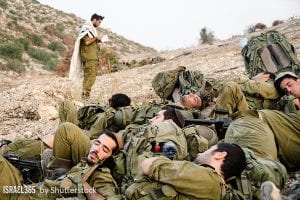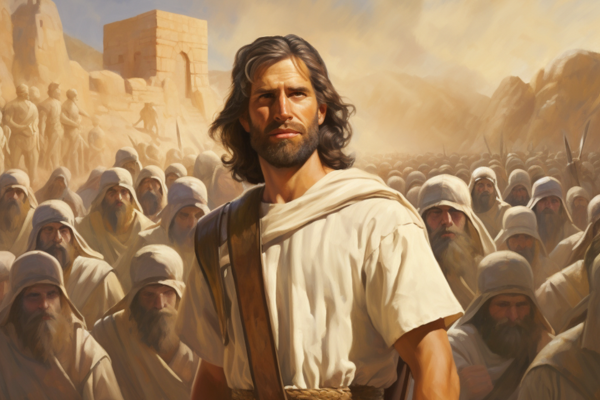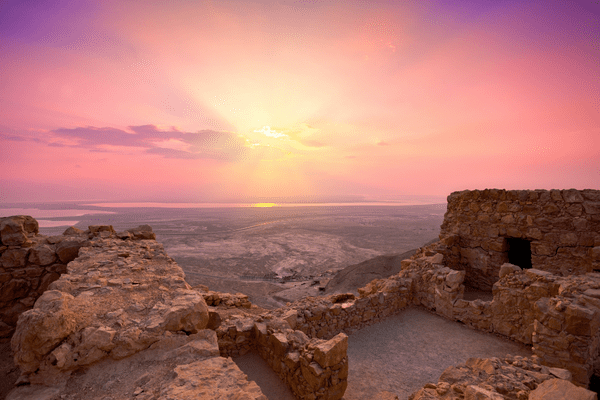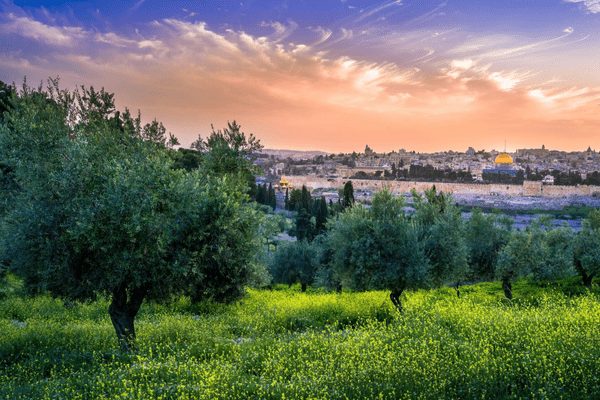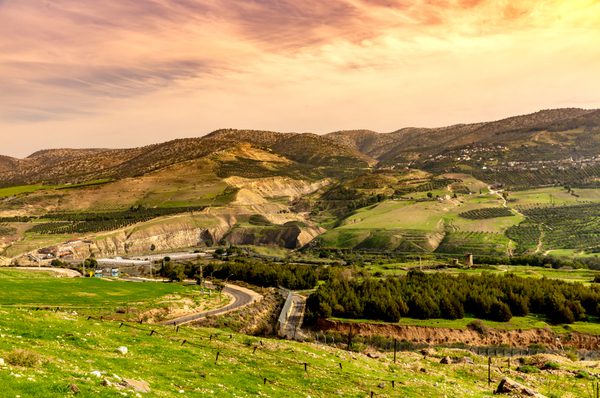
TORAH
NEVI'IM
KETUVIM
Chapter 12
Translation and Transliteration of
Listen to this chapter in Hebrew:
- Commentary
- Buy E-book
- Buy the Israel Bible
1The following are the local kings whom the Israelites defeated and whose territories they took possession of: East of the Yarden, from the Wadi Arnon to Mount Chermon, including the eastern half of the Arabah:
אוְאֵלֶּה מַלְכֵי הָאָרֶץ אֲשֶׁר הִכּוּ בְנֵי־יִשְׂרָאֵל וַיִּרְשׁוּ אֶת־אַרְצָם בְּעֵבֶר הַיַּרְדֵּן מִזְרְחָה הַשָּׁמֶשׁ מִנַּחַל אַרְנוֹן עַד־הַר חֶרְמוֹן וְכָל־הָעֲרָבָה מִזְרָחָה׃
2King Sihon of the Amorites, who resided in Heshbon and ruled over part of Gilad—from Aroer on the bank of the Wadi Arnon and the wadi proper up to the Wadi Jabbok [and] the border of the Ammonites
בסִיחוֹן מֶלֶךְ הָאֱמֹרִי הַיּוֹשֵׁב בְּחֶשְׁבּוֹן מֹשֵׁל מֵעֲרוֹעֵר אֲשֶׁר עַל־שְׂפַת־נַחַל אַרְנוֹן וְתוֹךְ הַנַּחַל וַחֲצִי הַגִּלְעָד וְעַד יַבֹּק הַנַּחַל גְּבוּל בְּנֵי עַמּוֹן׃
3and over the eastern Arabah up to the Sea of Chinnereth and, southward by way of Beth-jeshimoth at the foot of the slopes of Pisgah on the east, down to the Sea of the Arabah, that is, the Dead Sea.
גוְהָעֲרָבָה עַד־יָם כִּנְרוֹת מִזְרָחָה וְעַד יָם הָעֲרָבָה יָם־הַמֶּלַח מִזְרָחָה דֶּרֶךְ בֵּית הַיְשִׁמוֹת וּמִתֵּימָן תַּחַת אַשְׁדּוֹת הַפִּסְגָּה׃
4Also the territory of King Og of Bashan—one of the last of the Rephaim—who resided in Ashtaroth and in Edrei
דוּגְבוּל עוֹג מֶלֶךְ הַבָּשָׁן מִיֶּתֶר הָרְפָאִים הַיּוֹשֵׁב בְּעַשְׁתָּרוֹת וּבְאֶדְרֶעִי׃
5and ruled over Mount Chermon, Salcah, and all of Bashan up to the border of the Geshurites and the Maacathites, as also over part of Gilad [down to] the border of King Sihon of Heshbon.
הוּמֹשֵׁל בְּהַר חֶרְמוֹן וּבְסַלְכָה וּבְכָל־הַבָּשָׁן עַד־גְּבוּל הַגְּשׁוּרִי וְהַמַּעֲכָתִי וַחֲצִי הַגִּלְעָד גְּבוּל סִיחוֹן מֶלֶךְ־חֶשְׁבּוֹן׃
6These were vanquished by Moshe, the servant of Hashem, and the Israelites; and Moshe, the servant of Hashem, assigned that territory as a possession to the Reubenites, the Gadites, and the half-tribe of Menashe.
mo-SHEH e-ved a-do-NAI uv-NAY yis-ra-AYL hi-KUM va-yi-t'-NAH mo-SHEH e-ved a-do-NAI y'-ru-SHAH la-ru-vay-NEE v'-la-ga-DEE v'-la-kha-TZEE SHAY-vet ham-na-SHEH
ומֹשֶׁה עֶבֶד־יְהֹוָה וּבְנֵי יִשְׂרָאֵל הִכּוּם וַיִּתְּנָהּ מֹשֶׁה עֶבֶד־יְהֹוָה יְרֻשָּׁה לָרֻאוּבֵנִי וְלַגָּדִי וְלַחֲצִי שֵׁבֶט הַמְנַשֶּׁה׃
![]() 12:6 Moshe, the servant of Hashem, assigned that territory as a possession
12:6 Moshe, the servant of Hashem, assigned that territory as a possession
In this chapter, which summarizes the wars fought by the Children of Israel to take possession of the Promised Land, we are also reminded of the wars Moshe fought. Moshe led the people against Sihon and Og, and captured the Gilead and the Bashan. This area became the inheritance of the tribes of Gad, Reuven and half of Menashe (see Numbers 32:33). The Bashan is now known as the Golan Heights, which Israel conquered in the Six Day War from Syria. Towering over the north of the country, the Golan Heights provides an essential strategic perch that is vital for Israel’s security. Coupled with its biblical significance, the Golan Heights remain an important part of the State of Israel. In his final interview before suffering a massive stroke in 2006, Prime Minister Ariel Sharon told Japanese reporters, “I am a Jew, and that is the most important thing for me. Therefore when it comes to the security of Israel I will not make any compromises…I don’t see any situation where Israel will not be sitting on the Golan Heights.”

Prime Minister Ariel Sharon (1928-2014)
7And the following are the local kings whom Yehoshua and the Israelites defeated on the west side of the Yarden—from Baal-gad in the Valley of the Lebanon to Mount Halak, which ascends to Seir—which Yehoshua assigned as a possession to the tribal divisions of Yisrael:
זוְאֵלֶּה מַלְכֵי הָאָרֶץ אֲשֶׁר הִכָּה יְהוֹשֻׁעַ וּבְנֵי יִשְׂרָאֵל בְּעֵבֶר הַיַּרְדֵּן יָמָּה מִבַּעַל גָּד בְּבִקְעַת הַלְּבָנוֹן וְעַד־הָהָר הֶחָלָק הָעֹלֶה שֵׂעִירָה וַיִּתְּנָהּ יְהוֹשֻׁעַ לְשִׁבְטֵי יִשְׂרָאֵל יְרֻשָּׁה כְּמַחְלְקֹתָם׃
8in the hill country, in the lowlands, in the Arabah, in the slopes, in the wilderness, and in the Negev—[in the land of] the Hittites, the Amorites, the Canaanites, the Perizzites, the Hivites, and the Jebusites.
חבָּהָר וּבַשְּׁפֵלָה וּבָעֲרָבָה וּבָאֲשֵׁדוֹת וּבַמִּדְבָּר וּבַנֶּגֶב הַחִתִּי הָאֱמֹרִי וְהַכְּנַעֲנִי הַפְּרִזִּי הַחִוִּי וְהַיְבוּסִי׃
9They were: the king of Yericho 1. the king of Ai, near Beit El, 1.
טמֶלֶךְ יְרִיחוֹ אֶחָד מֶלֶךְ הָעַי אֲשֶׁר־מִצַּד בֵּית־אֵל אֶחָד׃
10the king of Yerushalayim 1. the king of Chevron 1.
ימֶלֶךְ יְרוּשָׁלִַם אֶחָד מֶלֶךְ חֶבְרוֹן אֶחָד׃
11the king of Yarmut 1. the king of Lachish 1.
יאמֶלֶךְ יַרְמוּת אֶחָד מֶלֶךְ לָכִישׁ אֶחָד׃
12the king of Eglon 1. the king of Gezer 1.
יבמֶלֶךְ עֶגְלוֹן אֶחָד מֶלֶךְ גֶּזֶר אֶחָד׃
13the king of Debir 1. the king of Geder 1.
יגמֶלֶךְ דְּבִר אֶחָד מֶלֶךְ גֶּדֶר אֶחָד׃
14the king of Hormah 1. the king of Arad 1.
ידמֶלֶךְ חָרְמָה אֶחָד מֶלֶךְ עֲרָד אֶחָד׃
15the king of Libnah 1.the king of Adulam 1.
טומֶלֶךְ לִבְנָה אֶחָד מֶלֶךְ עֲדֻלָּם אֶחָד׃
16the king of Makkedah 1. the king of Beit El 1.
טזמֶלֶךְ מַקֵּדָה אֶחָד מֶלֶךְ בֵּית־אֵל אֶחָד׃
17the king of Tapuach 1. the king of Hepher 1.
יזמֶלֶךְ תַּפּוּחַ אֶחָד מֶלֶךְ חֵפֶר אֶחָד׃
18the king of Aphek 1. the king of Sharon 1.
יחמֶלֶךְ אֲפֵק אֶחָד מֶלֶךְ לַשָּׁרוֹן אֶחָד׃
19the king of Madon 1. the king of Hazor 1.
יטמֶלֶךְ מָדוֹן אֶחָד מֶלֶךְ חָצוֹר אֶחָד׃
20the king of Shimron-meron 1. the king of Achshaph 1.
כמֶלֶךְ שִׁמְרוֹן מְראוֹן אֶחָד מֶלֶךְ אַכְשָׁף אֶחָד׃
21the king of Taanach 1. the king of Megiddo 1.
כאמֶלֶךְ תַּעְנַךְ אֶחָד מֶלֶךְ מְגִדּוֹ אֶחָד׃
22the king of Kedesh 1. the king of Jokneam in the Carmel 1.
כבמֶלֶךְ קֶדֶשׁ אֶחָד מֶלֶךְ־יָקְנֳעָם לַכַּרְמֶל אֶחָד׃
23the king of Dor in the district of Dor 1. the king of Goiim in Gilgal 1.
כגמֶלֶךְ דּוֹר לְנָפַת דּוֹר אֶחָד מֶלֶךְ־גּוֹיִם לְגִלְגָּל אֶחָד׃
24the king of Tirtza 1. Total number of kings 31.
כדמֶלֶךְ תִּרְצָה אֶחָד כָּל־מְלָכִים שְׁלֹשִׁים וְאֶחָד׃






